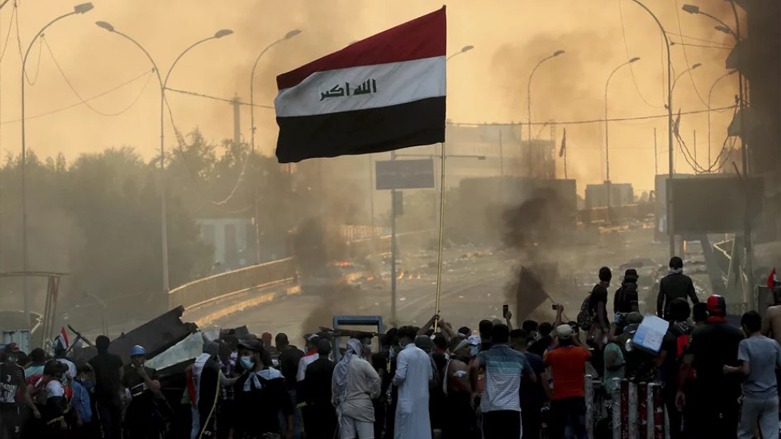Iraq Parliament dissolution closer than ever as struggle over government formation continues

ERBIL (Kurdistan 24) – Iraqi politicians are struggling to form a government as the country gets closer than ever to dissolving the parliament and holding new elections over five months after the last parliamentary elections.
Previous elections have shown that it takes time to decide upon the three presidencies – the speaker of parliament, the president, and the prime minister. Only after these presidents are elected can a new cabinet be formed.
However, this time the situation is much more problematic. It is a matter of life or death for some parties. It is not about getting more or less ministerial positions. It is about being in or out of government altogether.
Sadrist Movement leader Muqtada al-Sadr, who got the most votes in the October elections, is still firmly sticking to his goal of forming a national majority government and putting an end to the era of consensual governments in Iraq, which have been predominant since 2005. Such a move will not only impact the local political players. It will also impact the regional powers Iran, Turkey, the Gulf countries, and the United States.
Sadr doesn't treat Iran's Islamic Revolutionary Guard Corps (IRGC) Quds Force commander Esmail Qaani, a frequent visitor to Iraq, with obeisance. While he remains a vocal critic of Washington, Sadr appears to want to chart a different course after October's elections.
After the Iraqi Parliament repeatedly failed to achieve quorum and elect a president, Sadr gave the Shiite Coordination Framework (SCF) 40 days to work with the other political blocs and form a government.
Read More: What's next after Iraq's parliament failed to elect a president?
Through this initiative, Sadr only challenged the Iran-backed leaders of the SCF, knowing full well that they are incapable of winning enough votes to elect a president and form a government.
Staying outside the government for a populist leader like Sadr will empower him further and win him more supporters in the Iraqi street. For the Iran-backed political parties under the SCF, being kicked out of the government would markedly reduce their political and military power. It would also end the finances they receive by holding ministerial positions and Iran's political influence on Iraq.
These stakes justify Sadr's stubbornness over prolonging government formation. He doesn't fear the parliament's dissolution or reelections since he calculates he will win more votes in the latter case.
Sadr's phone call with Nouri al-Maliki, the leader of the State of Law, the largest bloc in the SCF, in early March evidently didn't reach its intended goal of compromise. The conversation only lasted a few minutes, and the two sides mainly appeared to reaffirm their positions and principles.
In the phone call, Sadr confirmed his insistence on a majority government, effectively telling Maliki that if he wants to form the government he is prepared to be the opposition himself.
The Shiite groups and Kurdish parties have found it challenging to find a middle ground and are divided between the two main alliances; the Saving the Homeland Alliance, including the Sadrist Movement, the Kurdistan Democratic Party (KDP), and the two large Sunni blocs, versus the SCF of Maliki's State of Law, and other pro-Iran groups, alongside the Patriotic Union of Kurdistan (PUK).
Maliki told his party's TV station in late March that the deadlock will continue and the danger of further derailing the political process will increase unless there is an agreement between the KDP and the PUK over a presidential candidate.
The PUK insists that the current President Barham Salih be re-elected. The KDP opposes the candidacy of Salih and wants its candidate, Rebar Ahmed, to be the next president.
Last week, the United States Ambassador to Iraq, Matthew Tueller, conveyed the urgency to the Kurdish leadership when he delivered a letter from President Biden to KDP President Masoud Barzani that reportedly urged greater Kurdish unity on government formation.
Sadr would like to increase the size of his coalition by adding a number of his Shia competitors. Still, he is vehemently opposed to allying with Maliki.
Maliki seems to have been able to keep his large alliance together until now, despite Sadr's multiple attempts to court some of his allies.
Whatever the outcome of the ongoing negotiations, the prospects of the next government will depend on the conditions of intra-Shia relations.
Apr. 6 Is the deadline for forming a government. After this deadline, the parliament can dissolve itself with the vote of two-thirds of its members.
Read More: Sadr thanks parliament members who attended Saturday's session 'out of love for Iraq'
SCF's lawmaker Ali al-Fatlawi told the media on Tuesday that the SCF had proposed a new initiative that might end the uncertainty the country has been mired in since the October 2021 elections.
According to Kurdistan 24 correspondent in Baghdad, the SCF has given a new offer to Sadr for government formation. Under this proposal, the SCF would provide all 12 Shiite shares of ministerial positions to the Sadrist Movement. Then the Sadrist Movement would form the largest Shite bloc in parliament with the SCF, and this bloc would choose the next prime minister together and have a say in electing the next Iraqi president.
However, this initiative seems to have zero chance of getting Sadr's approval since it disagrees with forming a majority government "neither eastern nor western," which he has consistently called for.